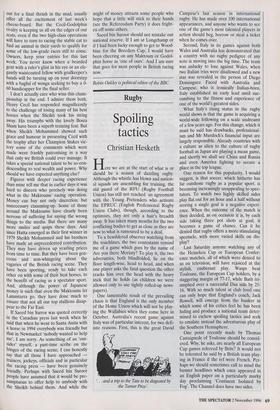Rugby
Spoiling tactics
Christian Hesketh
Here we are at the start of what is or should be a season of dazzling rugby. Although the whistle has blown and nation- al squads are assembling for training, the old guard of the RFU (Rugby Football Union) has still not reached an agreement with the Young Pretenders who activate the EPRUC (English Professional Rugby Union Clubs), though, according to the optimists, they are only a hair's breadth away. It has taken many months for the two conflicting bodies to get as close as they are now to what is rumoured to be a deal.
To a bewildered observer watching from the touchlines, the two contestants remind me of a game which goes by the name of Are you there Moriaty? To play it, the two adversaries, both blindfolded, lie on the floor length-wise, head to head, and when one player asks the fatal question the other cracks him over the head with the heavy stick that he holds (as children we were allowed only to use tightly rolled-up news- papers).
One lamentable result of the prevailing chaos is that England is the only member of the Home Union which will not be play- ing the Wallabies when they come here in October. Australia's recent game against Italy was of particular interest, for two defi- nite reasons. First, this is the great David . . and a trip to the Tate to be disgusted by the Turner Prize'. Campese's last season in international rugby. He has made over 100 international appearances, and anyone who wants to see one of the game's most talented players in action should beg, borrow or steal a ticket when he comes over.
Second, Italy in its games against both Wales and Australia has demonstrated that a country with no rugby pedigree of any note is moving into the big time. The team was unlucky to lose against Wales, when two Italian tries were disallowed and a new star was revealed in the person of Diego Dominguez. Faced with Australia and Campese, who is ironically Italian-born, Italy established an early lead until suc- cumbing to the fitness and experience of one of the world's greatest sides.
What Italy's rising status in the rugby world shows is that the game is acquiring a world-wide following on a scale undreamt of a few years ago. For this change, which it must be said has drawbacks, professional- ism and Mr Murdoch's financial input are largely responsible. Already countries with a culture as alien to the culture of rugby football as Japan are playing a mean game, and shortly we shall see China and Russia and even America fighting to secure a place in the top league.
One reason for this popularity, I would suggest, is that soccer, which hitherto has far outshone rugby as a popular sport, is becoming increasingly unappealing to spec- tators. To watch two highly skilled sides play flat out for an hour and a half without scoring a single goal is a negative experi- ence. When the outcome of the match is then decided, as on occasion it is, by each side taking three pot shots at goal, it becomes a game of chance. Can it be denied that rugby offers a more stimulating spectacle, with more varied skills on dis- play? Last Saturday anyone watching any of the Heineken Cup or European Confer- ence matches, all of which were denied to us on television, will have rejoiced at the stylish, exuberant play. Wasps beat Toulouse, the European Cup holders, by a staggering margin of 77-17, while Bath tri- umphed over a successful Dax side by 25- 16. With so much talent at club level one can only hope that England's coach, Jack Rowell, will emerge from the bunker in which some of his critics feel he has been hiding and produce a national team deter- mined to eschew spoiling tactics and seek to emulate instead the adventurous play of the Southern Hemisphere.
One point recently made by Thomas Castaignede of Toulouse should be consid- ered. Why, he asks, are nearly all European Cup games refereed by Brits? It would not be tolerated he said by a British team play- ing in France if the ref were French. Per- haps we should sometimes call to mind the banner headlines which once appeared in an English paper on a particularly murky day proclaiming 'Continent Isolated by Fog'. The Channel does have two sides.


















































































 Previous page
Previous page